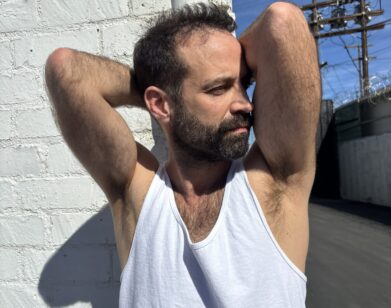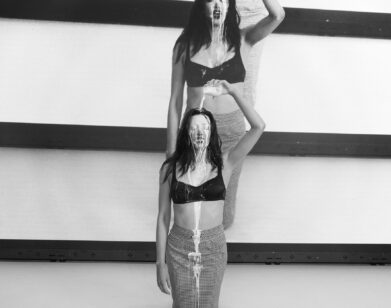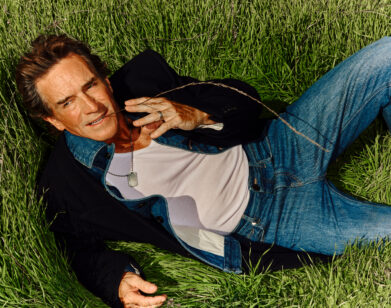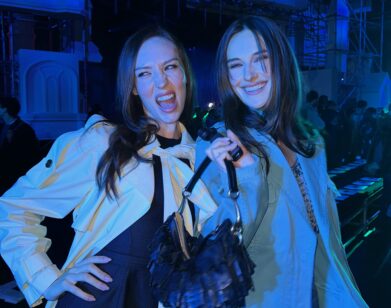Lizz Winstead’s V Day
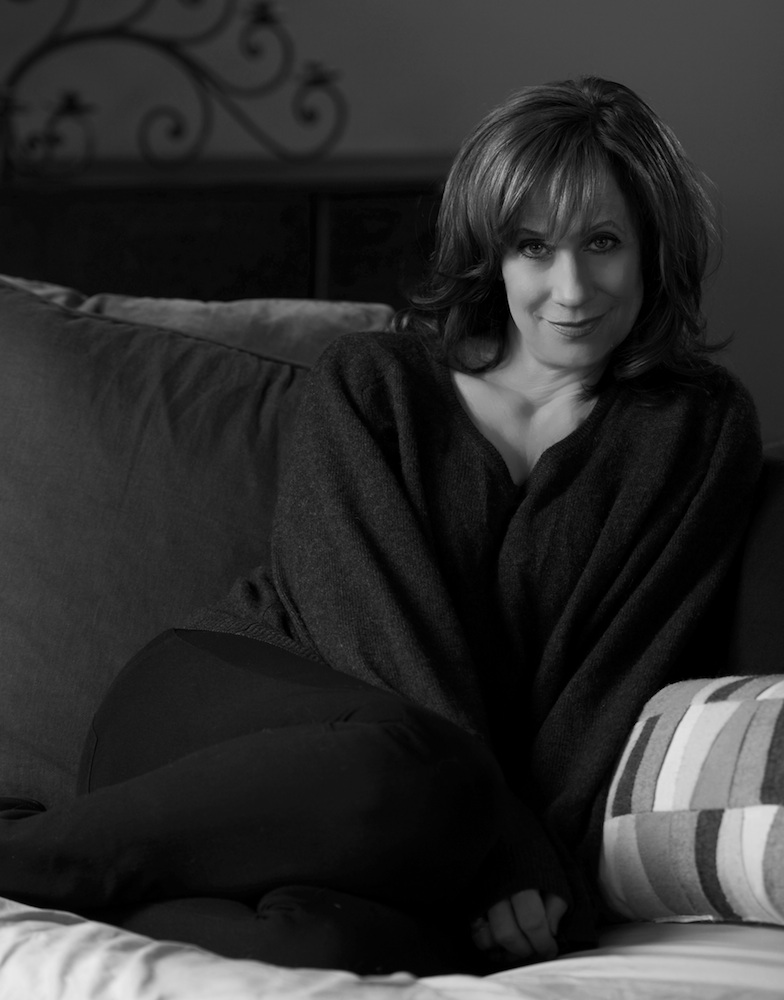
ABOVE: LIZZ WINSTEAD. PHOTO COURTESY OF MICHAEL YOUNG.
Tomorrow, Lady Parts Justice will host their second annual “V to Shining V” celebration, a day designed to encourage Americans to “party to plot, scheme, and change the laws disintegrating our reproductive access.” Twelve official events will take place across the country, from East to West Coast and Minnesota to Tennessee, involving celebrities including Tig Notaro, Janeane Garofalo, and Orange is the New Black‘s Lea DeLaria.
Co-founded by comedian Lizz Winstead, LPJ is something of a hybrid: an intersectional educational forum and community focusing on reproductive health and the future of women’s rights. Here, Winstead talks to her old friend DeLaria about the organization.
LIZZ WINSTEAD: They just asked me how long we’ve known each other, and I think it was 1992.
LEA DELARIA: I did Arsenio [Hall] in ’93, and that’s when I got catapulted into people’s eyes, but you and I met on the WGBH thing in Boston.
WINSTEAD: [laughs] That’s exactly right!
DELARIA: In fucking ’92, woman! A lot of people from that show went on to do things.
WINSTEAD: Kate Clinton was on the show, Betsy Salkind, that great Latina actress…
DELARIA: Liz!
WINSTEAD: Yes! Liz was on Emergency!, right?
DELARIA: She was on one of those shows.
WINSTEAD: Bertice Berry got her own talk show.
DELARIA: You did The Daily Show.
WINSTEAD: I remember we wrote these sketches that you and I were sort of fighting for that were a little edgier. But what I really remember really the most was you singing. The first time I knew that you were a singer, and you blew everyone away—one of those things where it was like, “Is this really happening right now?”
DELARIA: Yeah. I did the theme song. That was the other reason that I remembered Liz, because she and Bertice were the backup singers.
WINSTEAD: It’s a little known fact—people don’t know about my singing.
DELARIA: [laughs] You and I and Betsey Solkind—she was the third one—were always fighting for things that were a little edgier, and they were homogenizing it, the white liberal comedy show.
WINSTEAD: We were trying to make it the intersectional comedy show, and that was introducing a concept that was… “Isn’t it enough just to have gay people?” No…
DELARIA: It’s not. It’s really not enough to just have black women. A really good idea could be to comment on how they are treated by society.
WINSTEAD: One of the sketches I remember that was really funny, was we did a newscast and it was for the sports section, but they never sent anyone to film it, so we had to do drawings and re-enact it. We did a Title X sketch and we did a gag rule sketch— the gag rule was in place and doctors couldn’t talk to women about abortion. I’d love to see those tapes.
DELARIA: That one was charades, right?
WINSTEAD: Yes. It was doctor-patient charades.
DELARIA: I wrote a sketch for that that I was always very proud of about guns in America, in answer to them going, “Guns don’t kill, people do.” I remember the tagline was, “The family that slays together, stays together.” It was the hillbilly family. Every now and then we snuck a good one through. And then the next thing I knew, you were Miss fucking Daily Show!
WINSTEAD: I know! I didn’t get asked back for season two on that show either.
DELARIA: I can’t imagine why…
WINSTEAD: I probably, like I’m always doing, was pushing somebody’s button wrong.
DELARIA: Padding your vagina.
WINSTEAD: I know. That’s such a sad fact.
DELARIA: We are talking about the state of comedy in the early ’90s. Not that it’s that much better now.
WINSTEAD: The state of comedy and the state of reproductive healthcare have flat-lined in the same way. It’s on the same track.
DELARIA: [laughs] I love that. Are you ready for this thing on the 26th that we’re doing?
WINSTEAD: I am ready! Lady Parts Justice is a staff of literally six people, and there are 12 events happening around the country, which I am trying to get a handle on. There is one woman, Amber Gavin, who is masterminding all of them and organizing them and then I’m trying to organize her, and I don’t organize anybody very well. But it’s pretty cool because you are doing this amazing event with Janeane Garofalo and Ted Leo and The Citizens Band. The L.A. thing is really cool, Susan Orlean and Sarah Thyre are interviewing Tig Notaro and Jen Kirkman about feminism and about the emotional places that specific pieces of art take them in this really cool house. I’m doing this crazy, grown-ass carnival in Minnesota. There’s something in Memphis. There’s a cool thing in Detroit. It’s pretty great. I feel like with five events last year, and 12 this year, we’re killing it.
DELARIA: I just want to put it out there that if you’re doing anything in Minnesota and it’s like a carnival, you should embrace the Minnesota way and there should be a butter queen.
WINSTEAD: Maybe we could carve a uterus out of butter.
DELARIA: I was going to go right for vagina.
WINSTEAD: You know what you never want to see? A vagina softening and then melting.
DELARIA: [laughs] Well maybe you never want to see that. I always want to see a vagina melting!
WINSTEAD: You’re right. What am I talking about? Like knife to butter!
DELARIA: I think we played right into Interview‘s hands with that one girl.
WINSTEAD: I know. I thought you were going to say that everything should be on a stick, because in Minnesota they have this state fair that’s insane and you eat everything on a stick.
DELARIA: Brilliant. I’m all for food on a stick. I’m not even going to go there. We’re going to get to a dildo joke in about two seconds. That’s ripe for a dildo joke. Why does that always happen when I talk to you?
WINSTEAD: I don’t know. But we can prevent that.
DELARIA: I think you bring it out in me.
WINSTEAD: It might be true. I’ve become so all-consumed with using my humor to smash stigma, whether it’s sexual stigma, abortion stigma, reproductive justice stigma, gender non-conformity stigma. So I feel like maybe I’m overly compelled to be inappropriate all the time so that walls will break down and in five years, what seems like I’m insane now, will just be the normal way that people talk about their sexuality.
DELARIA: It will be nothing. I was called back to that time when I did the Arsenio [Hall] show and was the first queer comic on television in America. I walked out and said, “It’s the 1990s, it’s hip to be queer and I’m a big dyke.” It’s innocuous now, you don’t even think about it. Back then it was huge. It spurred that whole conversation about should we call ourselves dykes? Should we refer to ourselves as queer? What’s the point if we’re going to be comics and get up on stage and talk about airplane food? What’s the fucking point?
WINSTEAD: If you’re a woman and you’ve decided to step in front of people on any kind of platform and say that you have feelings about anything, you are committing a radical act. People view it as such, so you might as well actually commit a radical act. Standing on stage is amazing and it’s groundbreaking to see women even asserting their opinion on the most innocuous of things, so you might as well just go for it. Nobody can really hurt you anymore. We just did this big abortion storytelling show in Washington, D.C., and some rightwing website wrote about it and was trying to shame us: “These women are pro-abortion.” “Wow, breaking news. We’re standing on stage talking about our abortions, how are you going to shame us again?” They don’t know what to do if you claim your own story. If somebody wants to shame you about your own personal story, and how you felt about it, then that person has serious issues.
DELARIA: Let me ask you something, because some of this is meant to be in an interview format. Do you find yourself defending statements that you made to other women? What’s up with that?
WINSTEAD: Sometimes, yes. If I’ve said something off the cuff that I didn’t think through, and then I feel bad that I said it, alright, I’ll cop to it. But if I’ve thought it through and I can defend it and I have a reason for feeling that way, I often will give my reason for saying it, but I’m not going to let somebody get into an argument with me about a philosophical point that I might feel. Those things, for me, come from lived experience, shared experience. I’ve spent three years on the road talking to people who work in clinics, use clinics, support clinics, and get information from them, so it’s not like I’m some flibbertigibbet who’s getting on stage and doing a benefit. I’m visiting the clinics, I’m talking to patients, I’m talking to clinic escorts. There are people that say you should never use humor to talk about anything that’s important or hard, and since I don’t believe that, at some point there has to be a level of “agree to disagree.” There was a really big chasm in our movement that didn’t really use humor to mobilize people in a way that was relentless. It’s not like I’m trying to tell people this is the only way to talk about this issue, what I’m saying is this is the way I’ve been talking about this issue and it’s working and people are responding. I’m filling a space that didn’t exist before, and if you don’t dig it, and if you think I swear too much, that’s cool, there’s plenty of other messaging, and plenty of other ways you can go and encourage people. And you should do that. But don’t demonize what you do, I do, what other comics are doing, when you see people showing up and listening and responding because they’ve heard the messaging in this new kind of way.
DELARIA: Don’t argue with results.
WINSTEAD: Yeah. Unless you can point to something that I have done or said that has changed the course of the public opinion in a negative way, you’ve got to check yourself sometimes and say, “Maybe I don’t like the way that this thing is said, but it’s expanding tolerance.” If I said something that was shutting down something that was positive, yeah, call me out, but I don’t really see me doing that.
DELARIA: That’s not really your thing. Sometimes I get things from people where I feel like, when I make a statement, I have 57 years of experiences behind that statement. I don’t make important statements lightly. When I’m talking about something that’s important to me, I’m bringing 57 years of my feeling and my experiences into it and thoughts. It may seem funny and instantaneous and impromptu at the moment, because that’s who I am, but what’s behind that is all of my experience, all of what I believe. Every now and then you say, “Look, I’m only human.” I might say something because in my head it was really funny and then someone points out, “You said this.” And I’ll say, “Yeah, you’re really right.” I’ll be the first person to say that. I’m with you on that. I think it’s a really good idea for people to know that you’re human, that things can happen like this.
WINSTEAD: I think it’s also good—because we’re all humans and have flaws and frailties and screw up—to see that you can make a mistake in public, recover from it, move on, and you’re not defined by it. It’s a very good lesson for people who are private people as well. If there is a setback or a failure, it’s up to you at that point to say, “Am I going to let the last thing I did define me? Or am I going to do something great and let that thing be the thing that defines me at that moment, and then the next thing after that.” I like to use the analogy of when you’re in public and you wipeout and your backpack goes flying and you’re laying there on the sidewalk and everyone’s staring at you, and right at that moment everything is the most fucked up thing ever, and an hour later, you don’t even remember that that thing happened. That’s basically life. Really, it’s about narcissism; no one is ever thinking about you all that much. You always think people are thinking about you way more than they are.
DELARIA: Even if you’re Brangelina, no one is thinking about you that much.
WINSTEAD: Yes! Last night we watched Venus and Serena play tennis and no one was think of Brangelina. Or Donald Trump…actually we were thinking about Donald Trump for a little bit because he got booed at the tennis, but it’s the good thing and the bad thing about society, how short-term memory everything is. It should be an element of freedom for everybody.
DELARIA: Except if you’re Donald Trump. There is no short-term memory.
WINSTEAD: There are those touchstone moments where it’s like, “Time to clean up the Facebook.” People I have fucked who I thought were relatively rational people sayings, “But he says what people think!” A) Oh my god, I fucked you and—
DELARIA: Oh my god. I didn’t fuck anybody who actually said that.
WINSTEAD: It’s a moral failing on my part. And B, you don’t get to say whatever you want when you’re president. I think he literally thinks he’s going to buy the world and sell off countries he doesn’t like.
DELARIA: A really great quality in a comic, I think, is you say what people think but frankly, I’ve got to be really clear, [Trump] doesn’t say what I think. He says what racists, ultra-conservative, fuck-assholes think. I can’t give it up for that at all. It’s infuriating to me.
WINSTEAD: People don’t even realize that when they say, “He says what people think,” what they’re really saying is, “He says what I think.” They don’t understand that you and I are going to go, “That’s what you think? Oh my god. Unfollow. Block. Delete.” I do feel, though, that it has been easier to talk about issues; it has been easier to say you’re a feminist because it’s actually awesome to be one. The panopoly of people identifying as feminists is really excellent now that we’ve come to a point where all these really interesting voices are rising up and saying they’re feminists – women of color, trans people, gay folks, everybody. It’s an exciting time to actually define as that because it means that people are really feeling like their voice is what’s the most important thing in the movement, and I love that.
DELARIA: And being heard. I know that we talked about this recently, but we both speak at a lot of universities, and I’m so excited by what I’m finding when I go to talk to universities now. I’m finding a group of young individuals who want to get involved, who really have something to say. For a few years there, I was really annoyed with the “now” and “me” generation, the 18 to 26-year-olds. I felt like they were lost, they had no focus, they didn’t want to be a part of any kind of change that was happening. But now everybody’s a feminist—male, female, trans. Gender’s so passé they don’t even care anymore. They know what equal rights are, they know what it’s about, and everybody is standing toe-to-toe strong about it and really fighting.
WINSTEAD: I was feeling that way too, and when I would go to traditional spaces within feminism, I would be the youngest person. But many of the young women that have talked to me—not all of them, but many—[have] said to me that what we love about Lady Parts Justice is that you are listening to us and you want the movement to reflect what we need. You’re not trying to right what happened to you and continue a message that maybe worked for you, but doesn’t work for us. And that’s exactly what we’re doing. It’s cool because our group is a majority women of color, a majority of women under the age of 32. We have a 16-year-old awesome feminist who’s part of our team in Alabama. It also keeps you feeling vital and going. I think Gloria [Steinem] was an inspiration for that, because she’s always been that person who listens to a spectrum of people, and I think it’s really fun to try and connect with them on where they’re at and I learn things. Like what trap music is.
FOR MORE ON LADY PARTS JUSTICE, VISIT THEIR WEBSITE.

